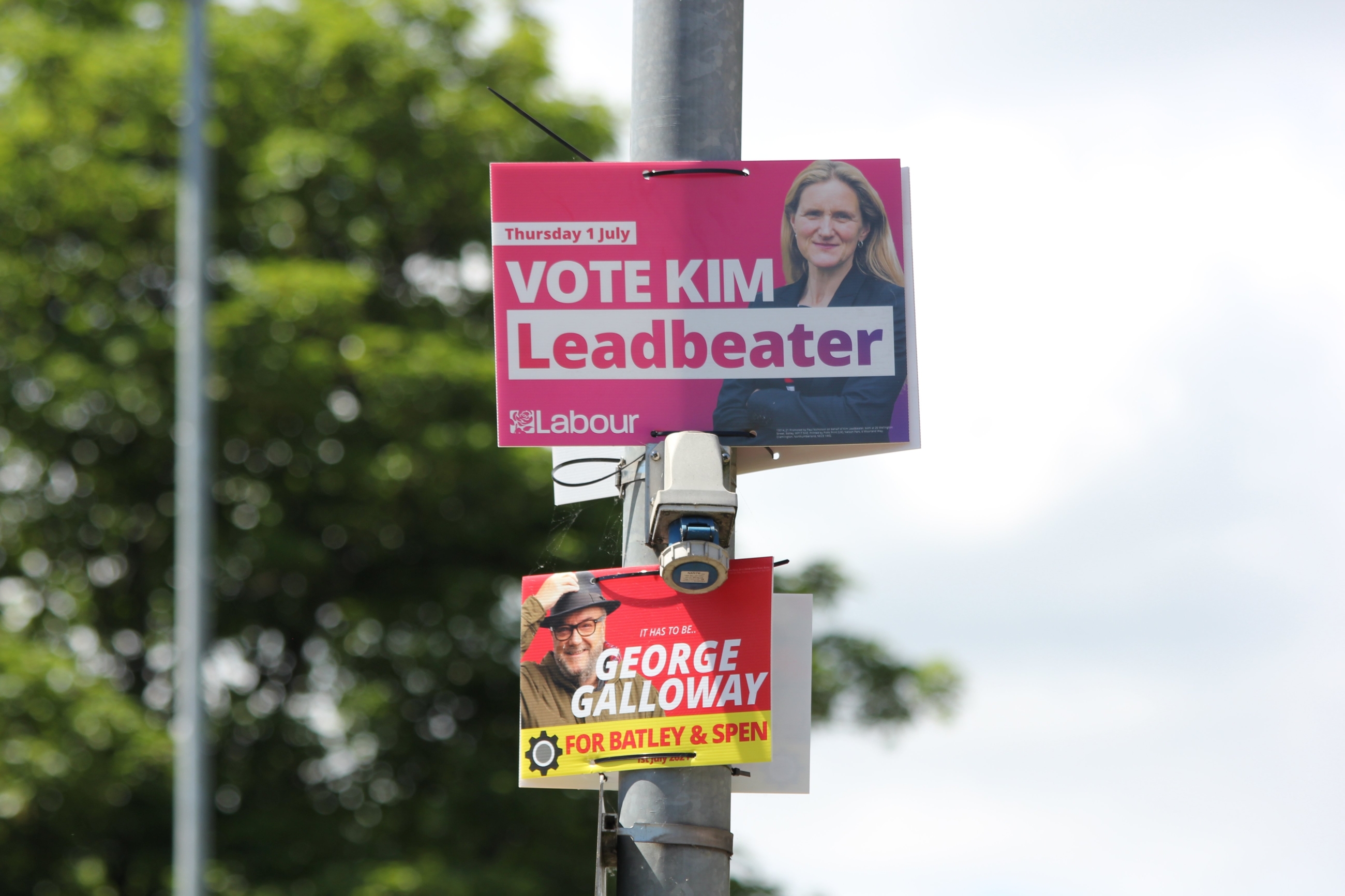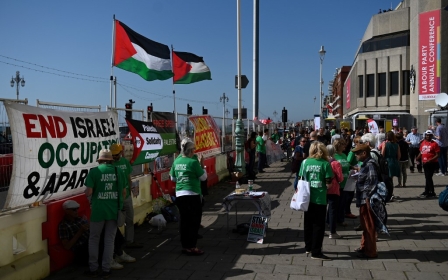Batley by-election: Will the Palestine issue destroy Keir Starmer's leadership?

George Galloway has been a thorn in the side of Labour’s establishment since he was thrown out of the party for urging British soldiers not to serve in the US-led occupation forces that invaded Iraq in 2003.
In 2005, he stood as an anti-war candidate in Bethnal Green and Bow, an east London constituency then served by a Labour pro-war MP, Oona King. Galloway overturned her 10,000 majority in a shock result that showed the power of the Muslim community to make its voice heard in the wake of the Blair government’s iniquitous role in the Iraq war.
Galloway was much condemned for “saluting” Iraqi dictator Saddam Hussein during a visit to Baghdad prior to the war, but he has batted off such criticism.
In 2012, he pulled his left-wing Respect party back from the dead with a surprise victory in the Bradford West by-election - a post-industrial constituency with a major Muslim population. Galloway referred to his victory over Labour then as the “Bradford Spring” in the wake of the Arab uprisings of the previous year.
Galloway, who represented Labour for decades in the party’s socialist working-class heartlands of Glasgow Kelvin, in recent years emerged as a mercurial populist able to win over Muslim voters while at the same time sitting alongside Brexit Party leader Nigel Farage as he embraced anti-EU British nationalism.
Brexit populism
In the recent 2021 local elections, Galloway publicly declared that he would be voting Tory in Scotland to oppose the SNP’s push for a second referendum on Scottish independence. His pro-unionist pop-up party failed to win a seat.
Two years earlier he had declared, not for the first time, “Me? Vote Tory? I’d sooner poke my eyes out, mate”. In a 2014 interview with Prospect magazine, he said: “If you ever see me standing under a Union Jack shoulder-to-shoulder with a Conservative, please shoot me.”
He also has a disturbing line in dog-whistle statements on gender and sex, such as a recent tweets burnishing his “anti-wokery” credentials in the prevalent UK culture war.
With all this, he is a major threat to Keir Starmer’s Labour Party in the Batley and Spen by-election, where around a fifth of voters are from the South Asian community.
Batley has a Labour council that has had to cut hundreds of millions of pounds from its budget because of Conservative government austerity policies, slashing almost £500m ($694m) across Yorkshire since 2010. It suffers entrenched poverty, like many of the neglected post-industrial regions that have neatly been relabelled as the “Red Wall”. Many voters have given up on Labour, which has dominated the region for decades, in the hope of getting a better deal from the ruling Tories under Boris Johnson.
Alienating voters
Labour’s new leadership has had a crash course in political reality this year. Starmer’s decision to suspend Jeremy Corbyn from the party last October, while his hatchet-man, General Secretary David Evans, launched a purge of the left in local parties across the country, marked the beginning of disenchantment and loss of support for Starmer’s “forensic leadership”.
A party leader who turns on his colleagues at the first sign of trouble - as Starmer repeatedly has - does not inspire confidence among party members, or voters.
His moves to appease pro-Israel lobby groups have alienated Muslim voters, as shown in his recent refusal to attend an Iftar meal because the Board of Deputies of British Jews told him an organiser was anti-Israel.
As Galloway told journalist Owen Jones in a recent film, the lazy idea that foreign policy is of little concern to the average voter is not the case in Batley. In fact, since Israel’s attacks on Jerusalem’s al-Aqsa Mosque in the middle of Ramadan and its latest onslaught against Gaza, Palestine could be the game-changer on 1 July.
Galloway says: “Palestine is hegemonic in at least a quarter of the constituency, and in a by-election, a quarter is a lot of people. And they are outraged by Labour’s dramatic switch [from Jeremy Corbyn’s support for Palestinian rights to Starmer’s support for Zionism “without qualification”).
The belief that Labour under Corbyn was more interested in so-called “niche” foreign policy issues than the lives of ordinary people in the UK - as if one must come at the expense of the other - has driven Labour’s new leadership to distance itself from everything that marked out Corbyn as someone able to criticise US militarism and Israel’s occupation of Palestinian lands.
Then, last month, a panicking Starmer suddenly decided to start talking about Palestine, bringing it up in prime minister’s questions for the first time since his election as leader, as if he’d woken up inhabited by the living ghost of Corbyn.
Not fooled
Starmer wasn’t fooling Labour voters in West Yorkshire. Fazila Loonat, Labour councillor for Batley East, told Jones: “Why [did it take] the leader up until prime minister’s questions last week to actually mention Palestine?… People are not happy."
On Indian-occupied Kashmir too, Starmer alienated many Muslim voters by a letter he wrote early on saying that the Kashmir issue was a bilateral one between Pakistan and India, breaking with Corbyn’s support for Kashmiri rights and self-determination.
Galloway is confident that Labour will come third in the by-election, despite polls suggesting it is second behind the Tories, with Galloway trailing a distant third. Muslim voters could be decisive.
If antisemitism was the weapon used to bring down Corbyn, it would be a profound irony if Palestine becomes the issue that finishes Starmer
Hanif Mayet, ex-Labour councillor of 12 years and a member of the party for 45 years, said: “One thing that the Asian community needs to learn and appreciate is that Labour needs to be sent a clear message - don’t take our vote for granted.”
Labour candidate Kim Leadbeater, the sister of murdered local Labour MP Jo Cox, admits there is a lot of anger in the Muslim community, but says that as a local campaigner she understands the area and is “prepared to listen to everybody from across the area”.
The party waived its membership rules to allow Leadbeater to stand ahead of two local councillors from the South Asian community, who did not make the shortlist.
“We have to be very strong on Palestine, the situation there is horrific, we’ve got innocent men, women and children being killed. My job is put pressure on the Labour Party, the government and the international community to do more.”
Pushed on whether the UK should stop arms sales to Israel, Leadbeater beats a retreat into fudge. “I think I would have to get involved in those discussions. There are people far better informed than I am on the Palestinian issue.”
Egged a little further by Jones to support a ban on arms sales to Israel, she hedges again, saying “the most important thing is to restart peace talks toward a two-state solution”. It’s a bland boilerplate statement that could come from any mainstream Conservative or Labour politician, and hardly addresses the fundamental issue of occupation, settlements and apartheid.
Inconvenient truth
The importance of this mid-term election for Keir Starmer, following his defeat in May in the nearby Hartlepool by-election and disappointing results in council elections, can’t be overstated.
Muslim voters make up 10 per cent or more of the electorate in 83 constituencies, according to a 2017 study, which is 13 per cent of all parliamentary seats. As a bloc they have a lot of latent power.
As Jones puts it, many former Labour voters may opt for a “demagogic opportunist” over a local Labour candidate as a protest against the leadership’s contempt for their values, showing how wrong it is for Labour’s ruling circles to believe that core Labour voters have nowhere else to go.
The inconvenient truth is that Labour under Jeremy Corbyn won Batley twice, once with a thumping 9,000 majority in 2017. Labour’s new centrist bosses want to pretend that the Corbyn surge of 2017 never happened. Such blindness to political reality may work in the Westminster media bubble but it won’t win back millions of lost voters.
This result could be a death blow to the flailing leadership of Starmer, who promised unity and electability but gave the party division, capitulation to the Tories and loyal service to the pro-Israel campaign that destroyed Corbyn’s leadership.
If antisemitism was the issue used to bring down Corbyn, it would be a profound irony if Palestine becomes the issue that finishes Starmer.
The views expressed in this article belong to the author and do not necessarily reflect the editorial policy of Middle East Eye.
Middle East Eye delivers independent and unrivalled coverage and analysis of the Middle East, North Africa and beyond. To learn more about republishing this content and the associated fees, please fill out this form. More about MEE can be found here.







